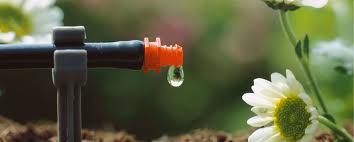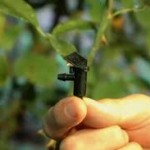Posts Tagged Drip irrigation
What is Drip Irrigation and Its Advantages?
 You may have heard the phrase “drip irrigation” thrown around and not been able to make heads or tails out of it. Fortunately, drip irrigation isn’t that complicated a concept to really understand.
You may have heard the phrase “drip irrigation” thrown around and not been able to make heads or tails out of it. Fortunately, drip irrigation isn’t that complicated a concept to really understand.
What is Drip Irrigation?
Irrigation is simply the process of artificially applying water to land or soil in order to stimulate growth. Farmers and property owners around the country rely on irrigation to create fuller crops or more appealing lawns.
Drip irrigation, also referred to as trickle irrigation, is a method of irrigation that’s extremely environmentally friendly. This is because drip irrigation applies water directly to the plant’s roots, root zone or the soil itself.
The fact that drip irrigation sends water directly to the surface that needs it most with a plastic device known as an emitter is especially relevant today. Parts of California, Texas and the Southwestern United States are experiencing their worst droughts in years, so a more intelligent irrigation system is a must.
Drip irrigation actually uses tubes and hoses to efficiently send water to a plastic emitter, which in turn sends water directly onto the plant’s roots or soil’s surface. This whole process saves a ton of water and fertilizing material.
More Advantages of Drip Irrigation
Even for farmers or property owners who like using fertilizer, drip irrigation allows you to retain nutrients while using less fertilizer – all the while achieving even better results!
Drip irrigation also allows you to keep the moisture level constant between the root zone and field capacity. And just to clarify, the term “field capacity” is simply the amount of moisture in the soil after the excess water has drained away.
Here’s some more good news for anyone who wants to try out drip irrigation – drip irrigation ensures less soil erosion and fewer weeds grow on your property. For farmers, this is a huge boon and directly increases their crop yield and profits. For regular property owners, this leaves your lawn looking crisp, green and lush.
For those concerned about rising energy prices, you’re bound to like drip irrigation as well. The process of drip irrigation is extremely water efficient and operates under less pressurization than most other types of pressurized irrigation, which translates to money saved on utility bills.
Because of drip irrigation’s higher efficiency, you’re also talking about smaller labor costs compared to other forms of irrigation.
Control in Your Hands
Due to the fact that controllable amounts of water make their way to the soil’s surface or the roots of plants, drip irrigation puts far more control into your hands.
You can regulate the amount of water that gets sent to each individual plant or section of your property by regulating the water pressure going to each output nozzle.
Drip irrigation is saving you water all the while as well since drip irrigation is estimated to use less than half the water of conventional sprinkler systems. So, you’re using less water and experiencing less nutrient runoff and soil erosion: This is definitely a recipe for long-term success.
Drip irrigation can even be set to a timer so that you can fully automate the watering process or cut it on/off at your discretion throughout the day. A drip irrigation system is highly adaptable and can be changed literally overnight to better suit the changes taking place on your property.
You can find out more about drip irrigation or set up an appointment by getting in touch with a Xeriscape lawn care professional today.
The Art of Irrigation

One of the challenges for a gardener is managing the proper use of water. The lack of water can be damaging, or deadly, to anything growing outside. DK Landscaping shares the art of irrigation and will help you prepare your garden for it.
Benefits of Drip Irrigation
By using drip irrigation, your garden will use less water, will require less maintenance, and help discourage less weeds and pests. You will be giving them the moisture they need, where they need it: at their root zone.
It will save you up to 90% compared to watering with a hose. It saves you time having your drip system on a timer. You control your irrigation timer and adjust it for seasonal changes (for instance, August heat in Northern California consumes the most water). Together with mulch creates an organic weed control without the use of harsh and unhealthy chemicals. Watering only the roots of your plants with drip irrigation also cuts down on water-borne pests and fungal diseases that spread by water movement.

With a timer, you can control how much water your plants receive by setting up your drip system with different size emitters, which are the system’s delivery mechanism. You can use a small emitter, such as one that delivers 1/2 gallon of water per hour, at the base of small plants, such as herbs; for larger plants, such as trees, you can provide more than one emitter that delivers 3 gallons of water per hour, or more.
DK Landscaping also recommends that all valves feeding the drip system should have:
Large Filter: A small filter or no filter will result in debris clogging the system.
Pressure Reducer: Absence of it will result in emitters being blown off the main feed line. Drip systems are designed to work under low pressure (nominally between 25 PSI to 35 PSI) while normal pressure on the water main line is nominally 70 PSI.
Pressure Compensated Emitters: Pressure compensating drip emitters (PC Emitters) deliver a consistent output of water, even with increase changes in elevation or pressure due to long drip runs. PC Emitters are best used in landscapes and gardens that have drops in elevation that would cause an increase in pressure.
Emitter Hole Punch: Oval or wrongs size holes will result in leaks.
For more information and a free consultation on your irrigation system, please contact Kathy Lee at DK Landscaping. Kathy is our QWEL (Qualified Water Efficient Landscaper) Certified Irrigation Expert. We are also a certified WaterSense Partner. QWEL and WaterSense are certified by the EPA.





